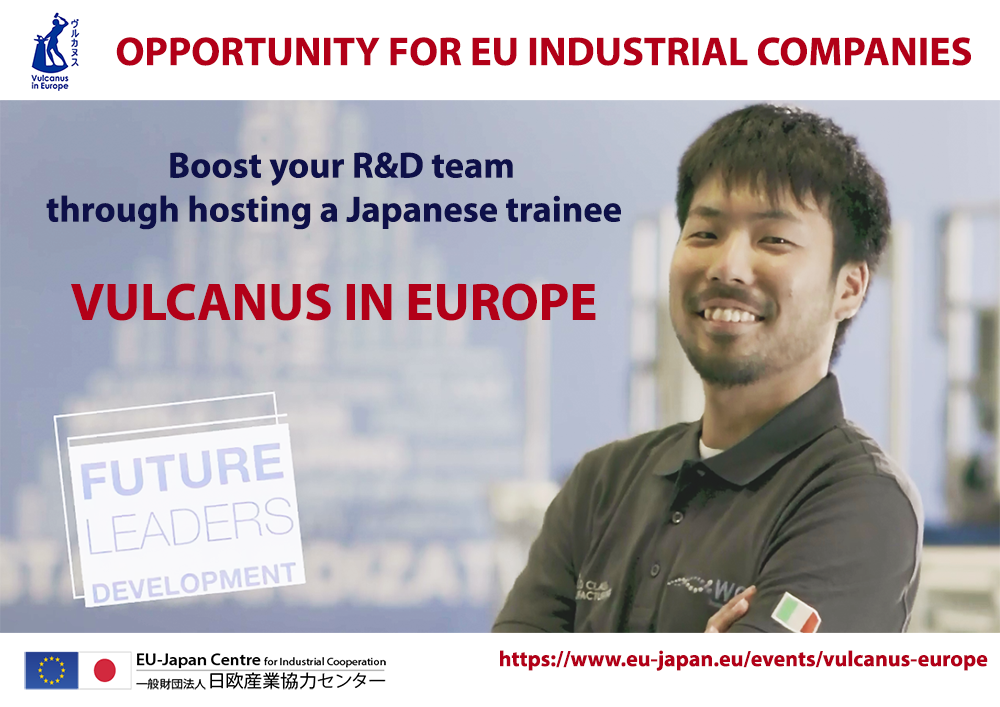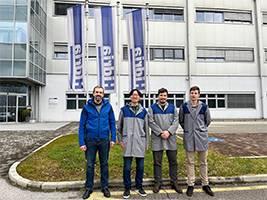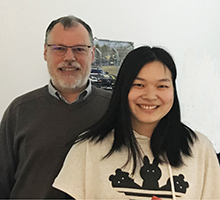
A unique opportunity for EU companies to host Japanese S&T university students as interns for R&D

Vulcanus in Europe 2026 - 2027:
Deadline: 20 September (new companies) - 30 September (former host companies)
Internship: 14 SEPTEMBER 2026 - 12 MARCH 2027 (6 months)
IN A NUTSHELL
The 'Vulcanus in Europe' programme offers EU companies an opportunity to host Japanese S&T university students as interns in R&D for a 6-month period.
'Vulcanus in Europe' takes place in Japan and Europe and is divided into two main parts:
BENEFITS FOR THE HOST COMPANY
By taking part in the Vulcanus in Europe programme, the host company will have a valuable addition to its R&D team who can bring in a Japanese perspective and make contribution to the company's R&D projects and needs. Vulcanus interns could also assist the company in the development of its business and contact with Japan.
ーーーーーーーーーーーーーーーーーーーーーーーーーーーーーーーーーーーーーーーーーーーーーーーーーーーーーー
TESTIMONIALS
| Shohei Kajiwara, PhD at Sophia University, Graduate School of Science and Technology (Physics Division) Vulcanus in Europe participant (April 2025 - March 2026) - Host country: Germany - Host company: Fibrecoat
|
|
| Keita Toyama, Hyogo University, Information Security Science Course, Data and Computational Science, Graduate School of Information Science. Vulcanus in Europe participant (April 2025 - March 2026) - Host country: Germany - Host company: Airbus
|
|
|
Yudai Morita, Tohoku University - Graduate School of Engineering, Department of Management Science and Technology |
|
  Mr Berginc Boštjan, Hidria Advancetec, Slovenia
|
Entering Vulcanus program was new for Hidria. Selection of students via video calls and communication with Vulcanus representatives was very efficient and conditions were clear from the beginning. After performing video interviews we agreed with a student Takuro Kondo to start traineeship at Hidria Advancetec. Being an electronics student and given his previous experience on software coding we involved him in new project related to Data analysis in Azure cloud. His work was mostly related to coding of building blocks for GUI for injection molding process. Data were analyzed in real time and visualized through charts in GUI. Takuro did not have much experience with cloud coding but he learned quickly and contributed a lot in this project. If he could stay for another couple months project could be completed in fulness, regardless of this we were satisfied with the amount of work that was done. For Hidria it was a positive experience having Takuro on board, learning about Japanese culture and way of living. We believe Takuro also had good time in beautiful Soča Valley region in Slovenia where Hidria is located. We wish Takuro all the best in his future challenges. |
|
|
"For the last 6 months we've had the pleasure to host our Vulcanus student Ayaka Ohashi at our company. Due to her study background in Nuclear Engineering she did not need much time to work herself into the details of our remote handling solutions for the Nuclear Industry. Ayaka's main focus was to support and independently work on projects related to the emerging field of Nuclear Fusion, mainly for the ITER (International Thermonuclear Experimental Reactor) project which is one of the biggest and most international infrastructure projects in world history. The work on her projects brought her together with customers from France, Spain and Japan. In addition to her work on the ITER projects Ayaka introduced Machine Learning concepts to our staff and has facilitated the process of possible integration of machine learning applications into our products. It was the first time for our company participating in the Vulcanus program and it was an absolutely positive experience for us. We thank Ayaka for her contributions, her hard work and valuable input during her internship at our company and wish her all the best for her future endeavors." |
|
|
"It was delightful for Hovione R&D to have the opportunity to participate in the Vulcanus program and to host Mr. Masahiro Nakai. It was impressive to see how quickly Nakai-san got a sufficient grasp of the Portuguese language to be able to communicate with other colleagues and co-workers. The great work capacity of Mr. Nakai and his methodical approach enabled a very successful internship and, in spite of noticeable cultural differences, it was remarkable to see him quickly integrate into the team and to bring a very positive work environment. Overall, it was an absolute pleasure to have worked with Mr. Nakai." |
 Ronald Reuter, Manager Raw Materials and Chemical Laboratory - R&D / TMD Friction Services GmbH (Germany), https://www.tmdfriction.com Vulcanus in Europe 2018/19 supervisor |
"We were hosting Ayano Michibata in our department from August 2018 until March 2019. It was already the second time for us to host Japanese students from the Vulcanus programme. Ayano san has done her own research project provided made a valuable contribution for the group. Besides, we have used her skills in three languages to improve our communication with the contacts in our (Japanese) parent company. As with the previous students, we have greatly improved our understanding of the Japanese culture and we had lots of fun explaining some details of the German aspects of daily life. For 2019, we have already accepted another student and are looking forward to gaining new insights into the Japanese mind and more valuable contributions to our work. Thanks to all the team at Vulcanus – you’re doing a great job”. |
|
|
BACKGROUND OF THE PROGRAMME
'Vulcanus in Europe' programme was launched in 1996 on the initiative of the European Commission and the Japanese Ministry of Economy, Trade and Industry (METI) with the purpose of contributing to the improvement and stimulation of industrial cooperation and of improving mutual understanding between Japan and the European Union. The EU-Japan Centre for Industrial Cooperation is responsible for the actual organisation of the programme.
The EU-Japan Centre currently produces 5 newsletters :









